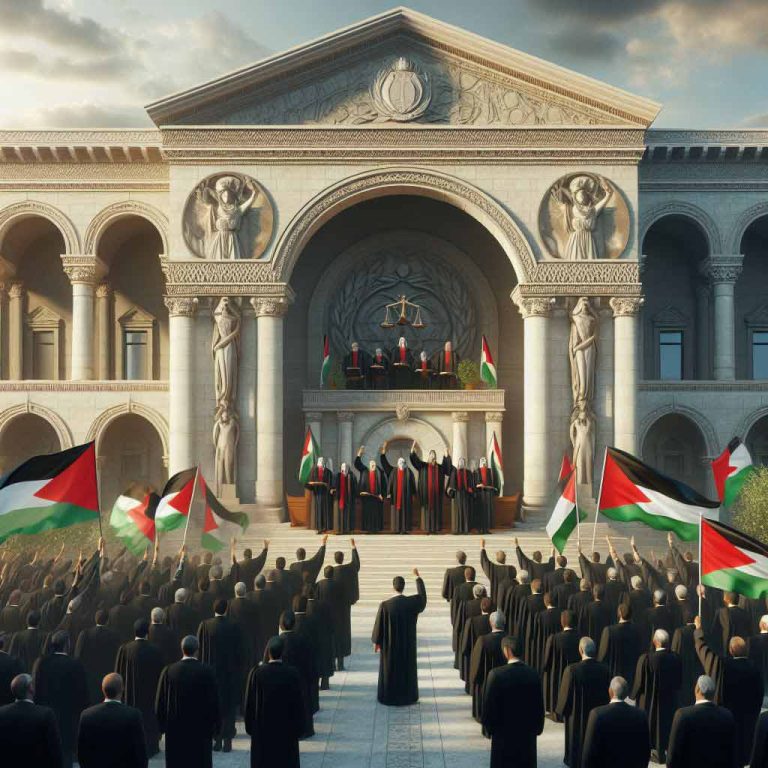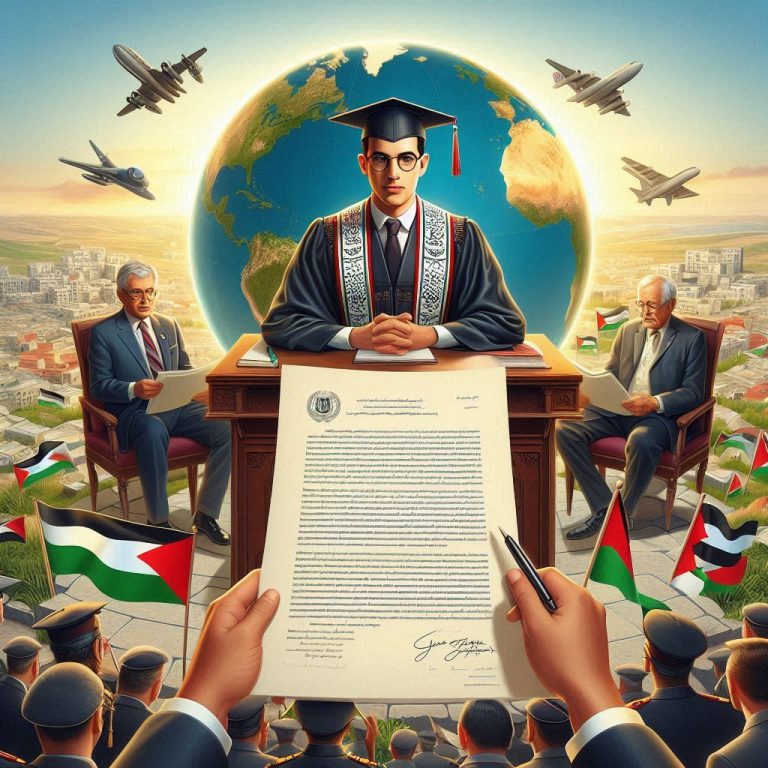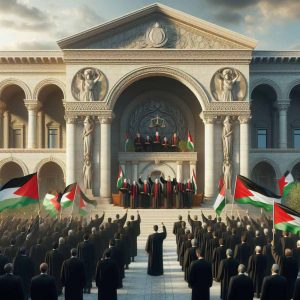The ICC and Palestine: An analysis of the case and its geopolitical implications
Ayesha Kajee
Hot on the heels of the ICC announcement, on Friday 24 May the International Court of Justice (ICJ), as part of the ongoing genocide case brought by South Africa against Israel, issued an emergency order to Israel to halt its military offensive in the Gazan city of Rafah immediately, as well as requiring Israel to reopen border crossings to allow humanitarian aid into Gaza, and to allow unimpeded access into Gaza to investigate genocide allegations.
Introduction
When Karim Khan KC, the chief prosecutor of the International Criminal Court (ICC), announced on 20 May 2024 that he had applied for arrest warrants against Israeli Prime Minister Benjamin Netanyahu and Hamas’s leader in Gaza, Yahya Sinwar, for war crimes, the political maelstrom unleashed in Israel, North America and western Europe was almost comical. As though they hadn’t seen this coming.
American president Joe Biden called it “outrageous”; Britain’s Prime Minister Rishi Sunak slammed it as “deeply unhelpful”, while his Canadian counterpart, Justin Trudeau, weighed in with “troubling”. Meanwhile, US secretary of state Antony Blinken proclaimed his willingness to work with Republican US senators on a bill to sanction the ICC!
While top Knesset legislators had welcomed Khan’s ICC appointment in 2021, last week’s announcement saw Netanyahu’s office release a video where the Israeli leader furiously lambasted the move as “a moral outrage of historic proportions” and animadverted Khan as one of the “great anti-Semites in modern times”. Israeli defence minister Yoav Gallant and Hamas’s political leader Ismail Haniyeh, along with Hamas military chief Mohammed Deif, are also wanted for arrest.
Citing various offences allegedly committed by Israeli soldiers in Gaza, Khan noted, “I have reasonable grounds to believe, on the basis of evidence collected and examined by my office, that Israeli Prime Minister Benjamin Netanyahu and Minister of Defence Yoav Gallant bear criminal responsibility.”
Hot on the heels of the ICC announcement, on Friday 24 May the International Court of Justice (ICJ), as part of the ongoing genocide case brought by South Africa against Israel, issued an emergency order to Israel to halt its military offensive in the Gazan city of Rafah immediately, as well as requiring Israel to reopen border crossings to allow humanitarian aid into Gaza, and to allow unimpeded access into Gaza to investigate genocide allegations.
Israel has responded by severely bombing Rafah in the 72 hours succeeding the ICJ emergency order, as widely reported on both social media and by some mainstream media outlets. This is consistent with the impunity Israel demonstrated in disobeying previous orders from the UN court in January and March respectively.
Differences between the ICJ and ICC
Before taking a deep dive into the ICC case, let’s clarify the differences between the ICC and the ICJ, which are frequently confused with each other.
Popularly known as the “world court”, the ICJ is one of the six “principal organs” of the United Nations, on par with the General Assembly, the Security Council, the Economic and Social Council, the Trusteeship Council and the Secretariat. Established in 1945, it arbitrates disputes between the 193 UN member states, in the interests of global peace and security. The ICJ is housed in the Netherlands at The Hague. Any UN member state can bring a case against any other member state, even if they are not directly in conflict, if the common interest of the international community is at stake. This is how South Africa brought its genocide claim against Israel to the ICJ, based on the 1949 Geneva Conventions.
By contrast, the ICC, also based in The Hague, is a criminal court which investigates and tries individuals for war crimes, genocide and crimes against humanity. The court was established in 2002 in accordance with the Rome Statute of 1998, an international treaty which governs the ICC. The ICC is an independent court, not a UN body, though it is endorsed by the UN General Assembly. Also, not all 193 UN member states are parties to the ICC, but it can launch investigations and open cases related to alleged crimes committed on the territory of, or by a national of, a state that is party to the ICC, or of a state that has accepted its jurisdiction. As a court of last resort, it seeks to complement, not replace, national courts, and acts when national courts are unable or unwilling to do so.
Israel is not a states party to the ICC, nor is the USA. (Although America did initially ratify the Rome Statute at the end of the Clinton presidency, this was withdrawn by the Bush administration.)
The ICC has conducted over 30 investigations to date, with the convictions of Congolese warmongers Thomas Lubanga and Germain Katanga, in 2012 and 2014 respectively, being among the most groundbreaking. Netanyahu is not the first sitting head of state for whom arrest warrants have been sought by the ICC prosecutor; that distinction belongs to former Sudanese president Omar al Bashir, whose warrant was issued by the ICC in 2009 for war crimes and genocide in Darfur.
The ICC investigation regarding Palestine
In 2015, Palestine (having had non-member observer status in the UN since 2012) acceded to the Rome Statute and became the 123rd member of the ICC. In 2018, Palestine referred the situation in occupied Palestine, including East Jerusalem, to the court, granting it jurisdiction over crimes committed since June 2014. In December 2019, former ICC prosecutor Fatou Bensouda concluded that there were reasonable grounds to investigate war crimes and crimes against humanity on Palestinian territory, and in February 2021 the court’s pre-trial chamber concluded that Palestine (comprising Gaza, the West Bank and East Jerusalem) falls within the court’s jurisdiction. The ICC investigation was opened in March 2021, and in November 2023 Bangladesh, Bolivia, Comoros, Djibouti and South Africa referred Israel’s conduct to the court once again, with the result that Khan announced that the ongoing investigation had been expanded to include actions taken since the current offensive in Gaza began during October 2023. The recent announcement by Khan is the first concrete result of that investigation.
The warrants announced by Khan last week – which must now be formally approved by the ICC’s judges – are related to alleged war crimes stemming from the ongoing war in Gaza over the past eight months. The details of the alleged crimes are laid out in Khan’s statement (available here: https://www.icc-cpi.int/news/statement-icc-prosecutor-karim-aa-khan-kc-applications-arrest-warrants-situation-state) and are supported by the Report of the ICC Panel of Experts (available here: https://www.icc-cpi.int/sites/default/files/2024-05/240520-panel-report-eng.pdf).
The war crimes allegations against Netanyahu and Gallant include: starvation of civilians as a method of warfare; wilfully causing great suffering, or serious injury to body or health; intentionally directing attacks against a civilian population; extermination and/or murder; and persecution as a crime against humanity. In addition to similar charges of extermination and murder, the allegations against the Hamas leaders also include rape, torture and hostage-taking.
The expert panel unanimously agreed that the applications for arrest warrants, with the supporting material, demonstrated both that the court has jurisdiction over the crimes, and that the crimes were committed, with the named suspects being responsible for them. They also noted that the panel “is satisfied that the process was fair, rigorous and independent and that the Prosecutor’s applications for arrest warrants are grounded in the law and the facts”.
What happens next with the ICC Palestine case?
The ICC process has six stages: preliminary examinations, investigations, the pre-trial stage, the trial stage, the appeals stage and the enforcement of sentence.
The Palestine case is now at the end of the investigations stage, where the chief prosecutor has requested the judges to issue arrest warrants. The case is entering the pre-trial stage, where, if and when the three pre-trial judges issue the warrants sought, the ICC will rely on countries to arrest and transfer suspects to The Hague. Once warrants are issued, states parties to the Rome Statute are legally obliged to transfer suspects who are on their territory. Thus, even though Israel is not an ICC member, travel by the suspects to any ICC member state could be severely curtailed, that is, if the ICC’s member states abide by their obligations. As experience shows, hypocrisy and double standards abound in geopolitics.
For example, after the ICC warrant for Sudan’s Bashir was issued in 2009, the ICC referred Kenya to the Security Council after Bashir visited Nairobi in 2010 with no arrest made. Subsequently, following a civil society request, the Kenyan High Court issued a warrant for Bashir’s arrest in 2011, tightening the noose at least on free movement. In 2013, Bashir left Nigeria less than 24 hours after he had arrived for an AU meeting, after both the ICC and civil society groups demanded Nigeria arrest him. Similarly, in 2015, Bashir once again evaded capture by hurriedly leaving South Africa before the High Court could rule on an arrest application. (Read more here: https://www.aljazeera.com/opinions/2015/6/16/bashir-and-the-double-standard-of-international-justice). Human Rights Watch has urged all ICC members to guard the court’s independence against “hostile pressure that is likely to increase while the ICC judges consider Khan’s request”.
But it is by no means certain that the pre-trial judges will issue the warrants Khan has sought, even in the face of the unanimity of the expert panel. Israel’s allies are already applying intense pressure in this regard. A few weeks ago, Republican lawmakers in the US submitted a letter to Khan’s office that threatened to bar him and his family from the country if he applied for warrants against Israeli leaders. Khan told CNN’s Christiane Amanpour that a senior US elected official had actually stated that the ICC “was built for Africa” and for “thugs like (Russian president Vladimir) Putin” but not Western or Western-backed leaders. Khan stands by the conviction that the ICC “is the legacy of Nuremberg, and this court is a sad indictment of humanity, and this court should be the triumph of law over power and brute force”.
Geopolitical implications of the ICC decision
In the context of the ICJ case, coupled with global civil society mobilisation against war and genocide, and particularly in view of the growing protests at universities around the world, ICC indictments would further undermine the legitimacy of Israel’s actions in Palestine and would very definitely complicate its relationship with European allies who are members of the Rome Statute. Hugh Lovatt, a Policy Fellow at the European Council for Foreign Relations, told Al Jazeera: “This would be a huge moment for the ICC itself, for Israel and just as importantly for Israel’s allies. … European countries supported the ICC arrest warrant against Vladimir Putin … so how can they come out and suddenly oppose or criticise an ICC indictment on Israeli officials?” Indeed, if Europe continues to protect Israel by refusing to arrest Netanyahu and Gallant, this would glaringly highlight the double standards of the West that many in the global south have criticised, and would undermine the rules-based order so vehemently touted by Biden, Von der Leyen and Sunak, among others.
……..
The implications will be far-reaching and go beyond western Europe, though, also affecting Israel’s relations with Asian, Latin American and African states that have long been buyers of Israeli military and surveillance equipment tested on Palestinians […]
………
France, as well as Belgium and Slovenia, have individually confirmed that they backed Khan’s move, exposing radical differences among European states’ approaches to the issue. Germany and the UK have expressed unwavering support for Israel since the current hostilities began. Meanwhile, Netanyahu’s foreign minister Israel Katz has travelled to France in a rushed bid to enlist French support.
The implications will be far-reaching and go beyond western Europe, though, also affecting Israel’s relations with Asian, Latin American and African states that have long been buyers of Israeli military and surveillance equipment tested on Palestinians, as Anthony Lowenstein exposes in his book, The Palestine laboratory. These include Bahrain, Nigeria, India, Saudi Arabia, Mexico and Indonesia, among many others. Indeed, in the past, some client states of Israeli arms companies (eg, Panama) have changed their stance in the UN following purchases of arms and/or surveillance technology, potentially raising further ethical questions.
……..
For Israel, increasing isolation at the international level appears to be on the cards, especially given its defiance of the ICJ orders. At the domestic level, Tel Aviv’s move to the far right of the political spectrum will be emphasised, with a possible ouster of Netanyahu, already beleaguered by a corruption case and swelling public antipathy within Israel.
……..
For Israel, increasing isolation at the international level appears to be on the cards, especially given its defiance of the ICJ orders. At the domestic level, Tel Aviv’s move to the far right of the political spectrum will be emphasised, with a possible ouster of Netanyahu, already beleaguered by a corruption case and swelling public antipathy within Israel.
For the Hamas leaders in Gaza, the arrest warrants will make little material difference, given that Gaza is essentially an open-air concentration camp under Israeli control anyway. For Haniyeh, currently based in Qatar, which is not an ICC member state, there may be minor complications regarding regional travel. If Qatar refuses to arrest Haniyeh, there may be knock-on effects from some of its allies.
A refusal by any ICC states parties to comply with an arrest warrant would hugely undermine both the ICC itself and the international rules-based order, also calling into question the legitimacy of all UN and other multilateral treaties, if they can simply be ignored with impunity when deemed inconvenient.
Perhaps the country most deeply affected by the ICC warrants, other than Israel itself, would be the USA. While itself not an ICC states party, US criticism of the Palestine case – in light of its previous support for the ICC warrants against Putin and Bashir, among others – exposes not only its double standards, but the shallowness of its much-touted moral compass.
Khan’s announcement already makes history and sets a precedent in international legal terms that, a year ago, would have seemed unattainable.
Further, a successful indictment and conviction in the ICC Palestine case would set a precedent that raises the spectre for US leaders, current and former, of possible indictment for similar crimes, committed either against citizens of member states or on the territory of member states, a prospect that no doubt gives Biden, as well as former presidents Trump and Bush, some uneasy moments.
————
Ayesha Kajee is a writer, human rights activist and development consultant in Johannesburg. Formerly director of South Africa’s Freedom of Expression Institute and founding director of the International Human Rights Exchange Program at Wits University, she is currently a research fellow at AFRASID. She writes for various media, including The Globalist and Al-Jazeera.
First Publishing
With author agreement for publishing









